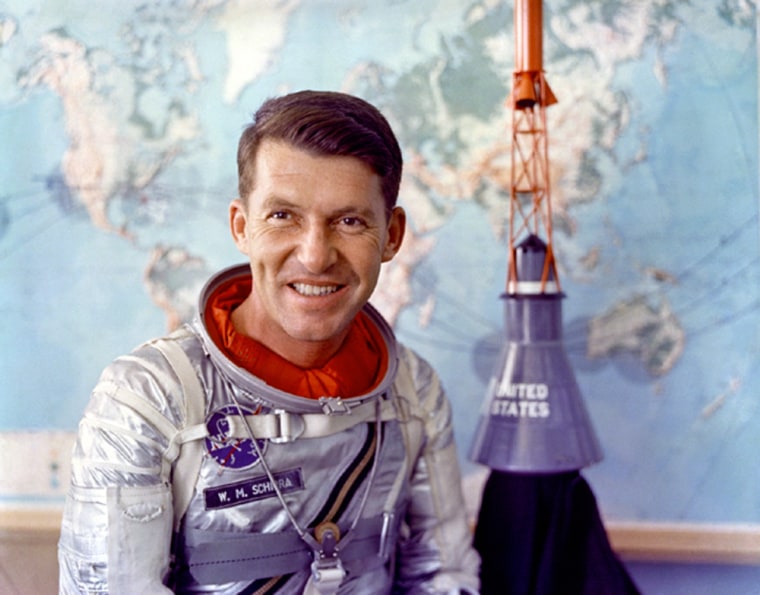Walter M. “Wally” Schirra Jr., who as one of the original Mercury Seven astronauts combined the Right Stuff — textbook-perfect flying ability and steely nerves — with a pronounced rebellious streak, died Thursday at 84.
He was the only astronaut to fly in all three of NASA’s original manned spaceflight programs: Mercury, Gemini and Apollo. Although he never walked on the moon, Schirra laid some of the groundwork that made the lunar landings possible and won the space race for the United States.
Schirra died of a heart attack at Scripps Green Hospital in La Jolla, said Ruth Chandler Varonfakis, a family friend and spokeswoman for the San Diego Aerospace Museum.
In 1962, the former Navy test pilot became the fifth American in space — behind Alan Shepard, Virgil “Gus” Grissom, John Glenn and Scott Carpenter — and the third American to orbit the Earth, circling the globe six times in a flight that lasted more than nine hours.
Schirra returned to space in 1965 as commander of Gemini 6. Some 185 miles (300 kilometers) above Earth, he guided his two-man capsule to within a few feet of Gemini 7 in the first rendezvous of two spacecraft in orbit.
On his third and final flight, aboard Apollo 7 in 1968, he helped set the stage for the landing of men on the moon during the summer of 1969.
Prankster and professional
An inveterate prankster, he could be grumpy and recalcitrant in space, most famously during his Apollo mission.
But “on Mercury, Gemini and Apollo, he flew all three and did not make a mistake,” said Christopher Kraft, who was Schirra’s Mercury and Gemini flight director and later head of NASA’s Johnson Space Center. “He was a consummate test pilot. The job he did on all three was superb.”
President Bush said in a statement Thursday that he and his wife were saddened by the death of “Jolly Wally.”
Slideshow 12 photos
Month in Space: January 2014
“His ventures into space furthered our understanding of manned space flight and helped pave the way for mankind’s first journey to the moon,” he said. “Laura and I join Wally’s family and friends and the NASA community in mourning the loss of an American hero.”
Of the Mercury Seven, only Glenn and Carpenter are still alive.
Schirra was named one of the Mercury Seven in 1959. Supremely confident, he sailed through rigorous astronaut training with what one reporter called “the ease of preparing for a family picnic.”
“He was a practical joker, but he was a fine fellow and a fine aviator,” Carpenter recalled Thursday. “He will be sorely missed in our group.”
Roger Launius, a space historian at the Smithsonian Institution in Washington, said Schirra “had a personality that was fun and effervescent. He had the gift of gab. He was able to take complex engineering and scientific ideas and translate that to something that was understandable.”
During his Gemini 6 flight in mid-December 1965, Schirra and crewmate Thomas Stafford unnerved Mission Control when they reported, slowly and in deadpan fashion, seeing some kind of UFO consisting of “a command module and eight smaller modules in front. The pilot of the command module is wearing a red suit” — Santa Claus.
Then Schirra and Stafford played “Jingle Bells” on a tiny, smuggled-aboard harmonica and a set of sleigh bells.
Earlier in 1965, Schirra also helped smuggle a corned beef sandwich onto Gemini 3 that Grissom took a few bites of during the flight, according to a NASA history.
“At times he gave us a hard time during his flight; technically what he did was superb,” Kraft said.
In the announcement of Schirra's death, NASA cited another classic tale from astronaut training: When one nurse insisted that Schirra provide a urine sample, he reportedly filled a 5-gallon jug with warm water, detergent and iodine and left it on her desk.
"It was impossible to know Wally, even to meet him, without realizing at once that he was a man who relished the lighter side of life, the puns and jokes and pranks that can enliven a gathering," NASA Administrator Michael Griffin said in his tribute to Schirra. "But this was a distraction from the true nature of the man. His record as a pioneering space pilot shows the real stuff of which he was made. We who have inherited today's space program will always be in his debt."
Laying the groundwork
Schirra blasted off from Cape Canaveral on Oct. 3, 1962, aboard the Sigma 7 Mercury spacecraft for his first flight into space. “I’m having a ball up here drifting,” Schirra said from space before making a perfect splashdown in the Pacific Ocean.
His Gemini mission represented a major step forward in the nation’s space race with the Soviet Union, proving that two ships could dock in space.
Kraft said Schirra showed great poise during a launch attempt for the Gemini flight, when the spacecraft’s booster ignited but shut down two seconds later.
Schirra and Stafford would have been killed in a massive explosion had the launch vehicle risen just a few centimeters, and Kraft said Schirra would have been warranted in triggering a launch ejection, but instead, he held steady, and the launch went off OK a few days later.
Schirra’s Apollo mission in October 1968 restored the nation’s confidence in the space program, which had been shaken a year earlier when three astronauts, including Grissom, were killed in a fire on the launch pad.
The Apollo 7 crew shot into space atop a Saturn rocket, a version of which would later carry men to the moon. But Schirra and his two fellow crew members were grumpy for most of the 11-day trip. All three developed bad colds that proved to be a major nuisance in zero gravity. (Years later, Schirra appeared in a TV commercial for the cold remedy he took.)
Life beyond NASA
Schirra left NASA a year after Apollo 7 and retired from the Navy with the rank of captain, having logged more than 295 hours in space. He became a commentator with CBS.
“Mostly it’s lousy out there,” Schirra said in 1981 on the occasion of the first space shuttle flight. “It’s a hostile environment, and it’s trying to kill you. The outside temperature goes from a minus 450 degrees to a plus 300 degrees. You sit in a flying Thermos bottle.”
Born in Hackensack, N.J., Schirra was practically bred to fly. His father was a fighter pilot during World War I and later barnstormed at county fairs with Schirra’s mother, who sometimes stood on the wing of a biplane during flights.
Schirra took his first flight with his father at age 13 and already knew how to fly when he left home for the Naval Academy in Annapolis, Md.
Schirra flew 90 combat missions during the Korean War. He was credited with shooting down one Soviet MiG and possibly a second. He received the Distinguished Flying Cross and two Air Medals.
In 1984, he moved to the San Diego suburb of Rancho Santa Fe, serving on corporate boards and as an independent consultant. His favorite craft became the Windchime, a 36-foot sailboat.
In one of his last interviews, last month with The Associated Press, Schirra said he was struck by the fragility of Earth and the absence of borders.
“I left Earth three times. I found no place else to go. Please take care of Spaceship Earth,” he said.
Survivors include his wife, Josephine, daughter Suzanne and son Walter Schirra III.
This report was supplemented by information from MSNBC.com.

